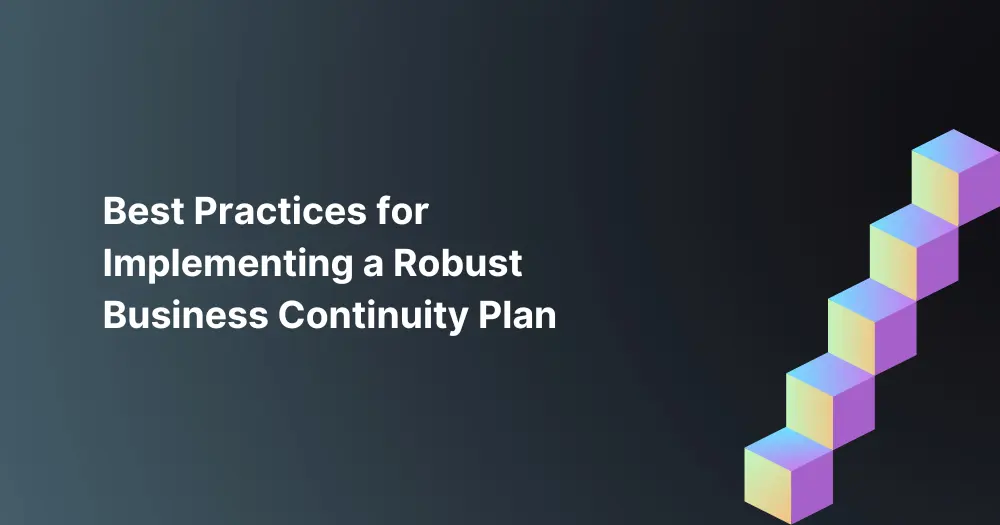In the ever-evolving business landscape, disruptions are inevitable and can strike when least expected. These interruptions can take various forms, from natural disasters such as floods or earthquakes to human-induced occurrences like cyberattacks or abrupt market shifts. Such unexpected events can pose significant threats to the smooth operation of your business. This is precisely why having a Business Continuity Plan (BCP) is critical.
A BCP is a strategic safety net for businesses. It outlines the procedures and actions a business should take in the face of such disruptions. Without a robust BCP, businesses risk experiencing significant financial loss, damaging their reputation, and potentially falling foul of regulatory compliance.
The benefits of implementing a Business Continuity Plan are manifold:
- Minimizing Downtime: A key benefit of a well-executed Business Continuity Plan (BCP) is its profound impact on reducing downtime. In the event of a disruption, a BCP ensures that your business can continue operating or at least maintain critical functions during a crisis. This ability to ‘keep the lights on’ can differentiate survival and closure for many businesses.
- Preserving Reputation: Reputation is a valuable yet fragile asset for businesses. Those that recover quickly from disruptions demonstrate reliability and resilience, which helps maintain the trust of clients and stakeholders. A robust BCP can preserve your business’s reputation by ensuring a swift return to normalcy after a disruption.
- Ensuring Compliance: For some industries, having a BCP isn’t just good practice—it’s a regulatory requirement. Even if not mandatory, having a BCP demonstrates due diligence and can help businesses stay on the right side of industry regulations and standards.
The importance of a BCP cannot be overstated. Businesses can safeguard their operations, workforce, and reputation against unexpected crises by identifying potential threats, understanding the impact of disruptions, and developing a comprehensive response strategy. With a robust BCP, businesses can navigate disruptions effectively, ensuring longevity and success in today’s unpredictable business environment.
A Comprehensive Guide to Implementing a Robust Business Continuity Plan
When it comes to creating a robust BCP, several steps and best practices can help ensure your business is well-prepared for any potential disruption:
- Involve Key Stakeholders: The planning process should be an inclusive one. This involves all key stakeholders, including senior management, IT, operations, and HR. Each stakeholder brings a unique perspective and expertise, contributing to a comprehensive and effective plan.
- Risk Assessment: The foundation of any BCP is risk assessment. It involves identifying potential threats to your business. Once these threats are identified, you assess their likelihood and the potential impact on your business. This process helps prioritize risks based on their severity and likelihood and allows you to focus your resources where they’re needed most.
- Business Impact Analysis: The next step is conducting a Business Impact Analysis (BIA). This analysis helps you understand the potential effects of disruption on various business functions and processes. For instance, how would a power outage affect your production line? What would be the impact of a cyber-attack on your online sales? By understanding these impacts, you can determine which areas of your business are most critical and must be prioritized in your BCP.
- Recovery Strategies: You can develop strategies based on your risk assessment and BIA. These detailed plans outline the steps to restore business operations quickly and effectively after a disruption. Recovery strategies should cover everything from restoring IT systems and data, rerouting supply chains, moving to an alternate location, to mobilizing a crisis management team.
- Crisis Communication Plan: Communication is crucial during a crisis. Your BCP should include a crisis communication plan that outlines how you will communicate with employees, customers, suppliers, and other stakeholders during a disruption. This plan should detail who will communicate, what they will say, and how they will say it. Clear and timely communication can help prevent panic, misinformation, and damage to your reputation.
- Plan Testing: Regular testing of your BCP under different scenarios is crucial to ensure it will work when needed. This can help identify gaps or areas that need improvement, allowing you to refine your plan over time.
- Plan Maintenance: A BCP is not a static document. It should be a living document updated regularly to reflect changes in your business or operating environment. This ensures your plan remains relevant and effective.
- Training and Awareness: Ensure all employees are aware of the BCP and their roles in it. Regular training sessions can ensure everyone knows what to do in an emergency, enhancing the overall effectiveness of your plan.
- Invest in Technology: Modern technology can significantly support your business continuity efforts. For instance, cloud-based services can provide data backup and recovery solutions, while communication tools can ensure you stay connected with employees and customers during a disruption.
You can craft a robust and efficient BCP by leveraging these insights and adhering to best practices. This plan will serve as your shield, protecting your business operations against potential disruptions. It also provides the reassurance of knowing you’re well-prepared to face any challenges that come your way, giving you the peace of mind to focus on growing your business.
Remember, the cost of creating a BCP will likely be far less than that of not having one when disaster strikes. So, take the necessary steps today towards implementing your own BCP. It’s an investment in your business’s future and resilience.
Harness the power of our managed IT services and protect your business today. With BlackPoint IT, you’re not just investing in IT support; you’re investing in business resilience and future growth. We’re ready to help you avoid potential problems and navigate the complexities of IT management. Contact us today for a free consultation.
